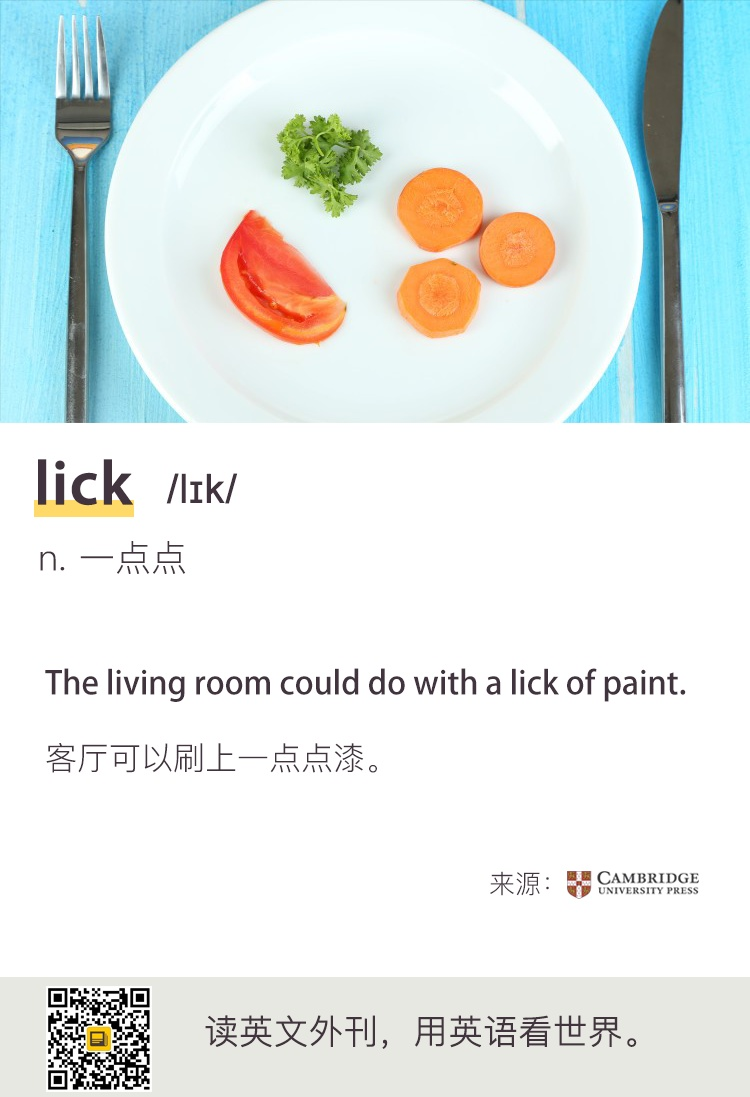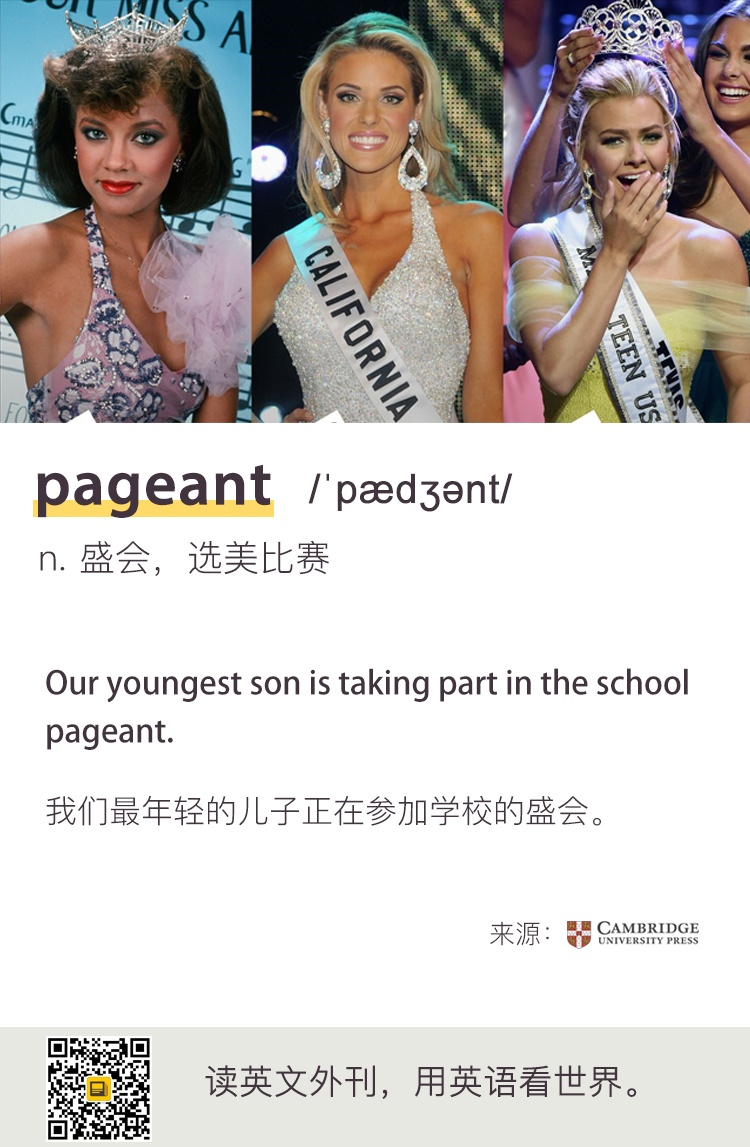物化时代:“美国小姐”取消比基尼比赛
感谢雪梨!
今日导读
一年一度的“美国小姐”大赛,总能吸引大批观众和粉丝的目光。最近外媒官方宣布,过往最吸睛的项目之一:比基尼选秀,从明年度(2019)大赛开始将被取消。《纽约时报》新刊登的一篇新闻就对此事进行了独到的评论,语言讽刺有深意,很值得一读,今天就让我们跟着雪梨老师一起来读一读其中的节选。
新闻正文
The bikini contest is over, but we are living inside the beauty pageant
比基尼选美结束了,但我们仍活在选美比赛里
On Tuesday morning came the news that the oldest beauty pageantin America is no longer a beauty pageant.
周二上午传来的消息称,美国最古老的选美比赛不再是一场选美比赛了。
注:开头用了倒装句型,由介词on引起的倒装,如果不倒装:On Tuesday morning the news came that。。。
Nearly 100 years after the first Miss America contest took place in Atlantic City — back then, the ladies wore one-pieces closer to burkinis than bikinis — the organization has said so long to the bathing suitcompetition. “We are not going to judge you on your outward appearance,” said Gretchen Carlson, the chairwoman of the Miss America Organization.
距离在大西洋城举办的第一届"美国小姐"比赛已经过去了将近 100 年。那时的女士们穿的连体式泳衣更像“布基尼”(burkinis指伊斯兰传统罩袍 burqa 和比基尼泳装 bikini的结合。——译注)而非比基尼。现在,这个比赛组织对泳装比赛说再见了。“我们不会以你的外表来评判你,”美国小姐大赛组织主席格雷琴·卡尔森说。
注: 句子中使用了插入语。one-pieces:连体式衣服,尤其指连体泳衣 。 bathing suit:泳衣。so long:再见,用法与goodbye差不多。juge sb on sth:以某个标准评判某人
But getting rid of the bikini contest won’t stop judges — and the rest of the world — from critiquing contestants’ outer beauty. As all women know, that happens even if we are shuffling down the block in old sweats.
但是取消比基尼比赛并不能阻止评委——和世界上其他的人——去评价参赛选手的外在美。所有女人都知道,就算我们穿着旧运动服在街上随便走上几步,也会引来这样的评判。
注:sweats /swets/ n. (运动时穿的)汗衫(sweat suit) sweat v. 出汗
The real reason the bikini contest was done away with is that it’s simply too explicit for our euphemistic era, where “strong” is the code word for skinny, and “healthy” for beautiful. Our culture hasn’t stopped objectifying women. We — men and women both — are just getting better at pretending it’s not happening. Ours is the age of Pilates and athleisure, of detoxifying and “wellness,” of organic and biodynamic, of game-ifying weight loss by calling calories points.
比基尼环节被取消的真正原因是,在我们这个委婉的时代,比基尼太露骨了。现在,“强壮”是瘦的代名词,“健康”是美的代名词。我们的文化并没有停止将女性物化。我们——包括男人和女人——只是越来越善于假装它没有发生。我们的时代是普拉提和运动休闲的时代,是排毒和“康盛”的时代,是有机和生物动力的时代,是通过卡路里计分把减重游戏化的时代。
注: do away with:废除,去掉。 code word:暗号。 wellness:健康。 organic:有机的。 biodynamic:生物动力的。
The game is now all about discretion — of insisting you aren’t working hard while you are absolutely gritting your teeth, of telling your date that you just don’t like bread. While men pretend not to judge women for the way they look, we go to great lengths to pretend we don’t care, either.
如今比的是不显山露水,比如,明明你在咬紧牙关,却坚称你没有在努力,对约会对象说你只是不喜欢吃面包。在男人们假装自己没有根据外貌评判女人时,我们女人也费尽心机地假装我们也不在乎。
注: grit your teeth:咬紧牙关。 go to great lengths to:费尽心机,不余遗力
I won’t miss the bikini contest a lick. But there was also something strangely honest about it. We are being watched and scrutinized and judged. We are watching and scrutinizing and judging. It is, as Ms. Carlson said, a competition.
我一点儿也不会怀念比基尼比赛。但这场赛事又带有一种奇怪的坦诚。我们是被观察、审视和评判的对象,也在观察、审视和评判别人。正如卡尔森所说,这说到底就是一场比赛。
注: a lick:一点点。
————— 文章来源 / 纽约时报 
重点词汇
pageant /ˈpædʒənt/ n. 盛大华丽的场景,露天表演,选美比赛 e.g. a beauty pageant
burkinis n. 布基尼(伊斯兰传统罩袍burqa和比基尼的结合)
critique /krɪˈtiːk/ v. 发表评论,批判 e.g. Students take turns critiquing each others' work.轮流评论
shuffle /ˈʃʌfl/ v. 洗牌(打牌时),拖沓着脚走路 e.g. I love shuffling through the fallen leaves.
euphemistic /ˌjuːfəˈmɪstɪk/ adj. 委婉的 euphemism n.委婉语气 比如说一个人去世不用die而用pass away,堕胎不用abortion
objectify /əbˈdʒektɪfaɪ/ v. 物化 object n.物体
Pilates /pɪˈlɑːtiːz/ n. 普拉提(一种运动,类似瑜伽)
athleisure n. 运动休闲
detoxify /ˌdiːˈtɑːksɪfaɪ/ v. 排毒 toxi--有毒的 de-去除、排除
game-ify = gameify v. 游戏化
discretion /dɪˈskreʃn/ n. 谨慎,慎重 e.g. He is a soul of discretion. soul: n. 灵魂;精神;人;幽灵 adj. 美国黑人文化的
scrutinize /ˈskruːtənaɪz/ v. 仔细检查,彻底检查 e.g. He scrutinized the men's faces carefully, trying to work out who was lying. 说谎
do away with 废除,去掉e.g. Computerization has enabled us to do away with a lot of paperwork.
grit one's teeth 咬紧牙关
go to great lengths 费尽心机,不遗余力e.g. Some people go to great lengths to make their homes attractive.
拓展内容:
英语中的委婉语(euphemism)
euphemism (委婉语)一词系源自希腊语,词头“eu”的意思为“good (好)”,而词干“phemism”为“speech (言语)”,该词的词义是“(to speak) with good words”,也就是说用“好听的话”或“吉利话”去代替直率的、刺耳、令人难以接受或触怒的词语。
举几个例子:
1)人们忌讳说“生病”、“患……疾病”等词语。
如:Jane was in a bad way and asked for two days leave。简身体不好,请了两天假。(be in a bad way: be ill / sick)
2)人们在生活中比较忌讳死亡,尤其对于受人尊敬和爱戴的人的死亡,更忌直接运用die, 因此出现了许多表达死亡的委婉语,如:pass away (逝世),depart(去世),be gone (走了), to go west (归西了),to be at peace (平静了),final sleep (最后一觉), to have found rest (得到安息),in heaven (在天堂),with God (和上帝在一起) 等。
3)在西方国家,年龄是一个非常敏感的话题,尤其对老年人和妇女,人们很少谈论其年龄。原因人们普遍忌讳年老,认为old (老) 是 useless (不中用) 的代名词,也因为年老意味着青春不再,意味着经济地位和社会地位的下降,所以old (老) 一词是令人难以接受的的词,于是便产生许多关于老年的委婉语。这些词语表达了老年人的某种愿望,希望自己生命永恒,或希望自己容颜不衰,体形不改。下列的词也常用来表示老年人senior citizens(高龄公民,资深公民)、the elderly (年长者)、 the mature (成熟的人),seasoned man (经验丰富的人,历经沧桑的人)。
4) 人们忌讳说“笨拙”、“残疾”、“肥胖”等及有关体型缺陷的词语。
1. The boy is a bit slow for his age. 在同龄人中这孩子脑子慢一点。(a bit slow: stupid)
2. The girl is hard of hearing. 这女孩耳朵不好使。(hard of hearing: deaf)
3. The school is for people who are physically challenged. 这所学校是专为肢体有残疾人的。 (people who are physically challenged: people with a physical disability)
4. She has a weight problem. 她太胖了。(a weight problem: be too fat)








